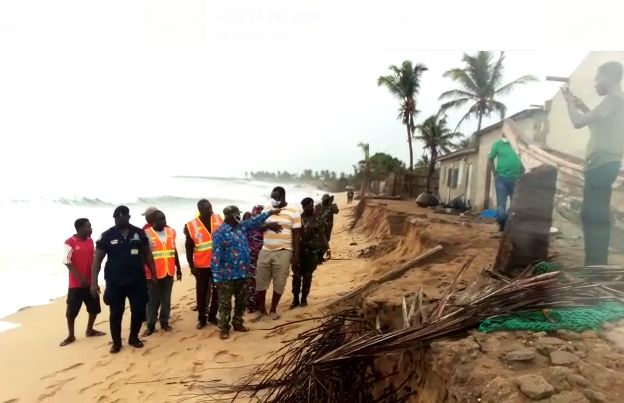Over 4,000 residents in the Ketu Municipality were on Sunday, November 7, left homeless after a storm surge invaded their homes and swept away properties worth thousands of Ghana cedis.
To educate the general public on what could have caused the tidal waves, lecturer at the Department of Oceanography & Fisheries of the University of Ghana, Mr. Selorm Dzako Ababio, speaking on JoyNews, explained that several factors may have aligned and prompted the storm surge that hit Keta.
They include an offshore storm pushing strong wind towards the shore, a high or spring tide and a low lying coastal environment.
According to Mr Ababio, who is also the Managing Director of Keli Engineering Consult Limited, the hot temperature currently being experienced in the country also accelerated the rising of the water level.
"If you add all these, you will have water rushing into the inland areas. When I looked at the data after the storm surge, I noticed that we had a spring tide, high tide and the highest was at dawn. There was a storm from the Atlantic ocean carrying a lot of wind towards the beach. Then we had experienced a lot of hot weather. So probably there was a low-pressure cell over that area," he explained.
Prior to his explanation, the Majority in Parliament led by their Deputy leader, Alexander Afenyo-Markin blamed the event on sand winning purportedly carried out by residents in the locality.
However, this has been challenged by the Minority, insisting that images being circulated by the Majority were from acts being carried out in Sierra Leone and not Keta.
Mr. Ababio admitted that sand winning activities are happening currently at the coasts of the Volta Region, and is contributing to the storm surge being experienced. This he said is because the sand on the shore is to serve as a barrier.
"The sand is supposed to act as a natural barrier. Periodically, there is overtopping. It happens naturally. However, if you remove the sand, you are more likely to have an overtopping sequence. I know that all across the coast of Ghana, there is sand winning. It is more prevalent in some parts. It was very prevalent in the Greater Accra Region than even the Volta Region."
"Laws have been made to reduce this. The intensity has gone down. There is very little industrial-scale sand winning that goes on. It does happen in small scales but whichever scale it is happening on, it has the potential to cause this," he added.
Latest Stories
-
Some supporters of Movement for Change return to NPP
20 mins -
NPP running mate saga: Stop putting pressure on Bawumia – Group tells lobbyists
24 mins -
IES calls for immediate removal of Matthew Opoku Prempeh over deteriorating energy crisis
1 hour -
GFA reschedule selected MD 28 fixtures to ensure maximum support for Dreams FC
1 hour -
A new financing model for SHS will leverage private sector to finance infrastructure – Bawumia to CHASS
1 hour -
Earth Day: CCCFS promotes adoption of ceramics to fight plastic pollution
2 hours -
Ten dead as navy helicopters collide mid-air in Malaysia
2 hours -
Kwadaso Onion Market: Traders relocated over security concerns
2 hours -
Organise your dumsor demo, we’ll choose who to partner for ours – Franklin Cudjoe tells Yvonne Nelson
2 hours -
Government to consolidate cash waterfall revenue collection accounts
3 hours -
‘Otumfuor is one of Kotoko’s biggest issues’ – Nana Agyemang
3 hours -
Bawumia travels to Italy and Vatican State
3 hours -
Bellingham wins Laureus Breakthrough award
3 hours -
2024 polls: Haruna Iddrisu predicts NDC victory in all 11 Upper West parliamentary seats
3 hours -
GPL: Berekum Chelsea beat Medeama to go fifth
3 hours

